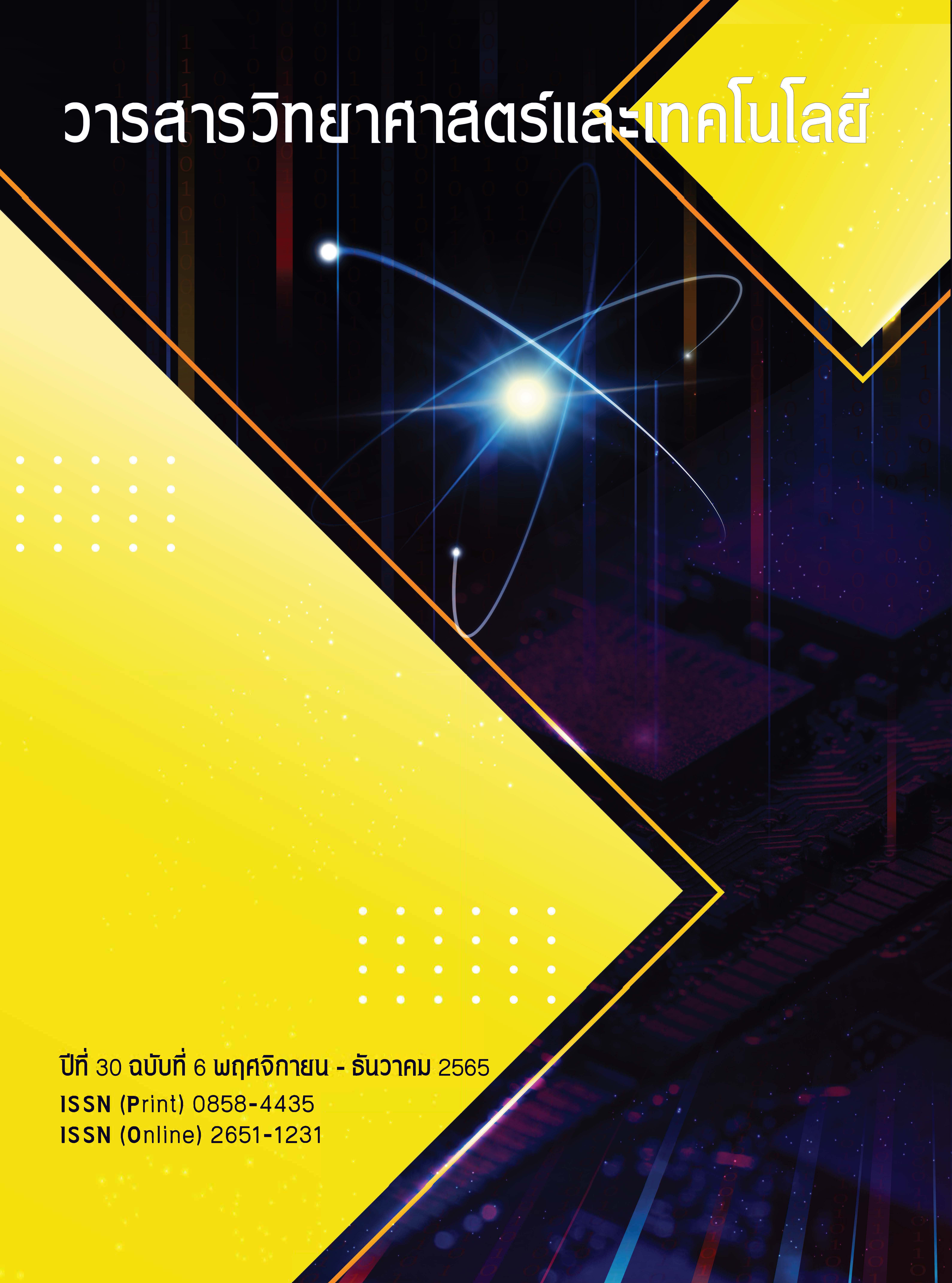Technology and Policy of Converting Waste into Energy: A Case Study of Thailand, the UK and the United States
Main Article Content
Abstract
From the constantly increasing volumes of waste problem situation and the amount of the waste that is not proper disposal and cannot be utilized for benefit in the high volume, waste-toenergy is an interesting alternative to bring non-valuable wastes for the maximum benefit and waste reduction before dumping into landfills that affect an environment in the future. Furthermore, the
waste-to-energy is one of the most efficient and sustainable waste management and can be a circular economy system. This review article focuses on the three types of waste-to-energy technologies; thermal technology, biochemical technology, and physical technology, including a comparison of the benefits and drawbacks of each technology and a study of policies and guidelines in waste-to-energy management of three countries; Thailand, the United Kingdom, and the United States for leading to waste-to-energy efficiency. Thermal technology is the most crucial technology for converting waste in three countries, and waste-to-energy is vital for waste management in each country. Policies of three countries have explicitly supported the waste into energy that there is a trend towards increasing and continuing technology development. Thailand should promote a section of policy development in the concept like the renewable obligation (RO) that encourages a generation of renewable energy to increase financial incentives for the amount of waste reduction before dumping into landfill and to find the energy that can replace fossil fuel as well as increasing efficiency of CO2 reduction; 1 kg of waste reduction will be able to reduce 6.3 kgCO2e per year. Moreover, it positively impacts on economic, social, and environmental development.
Article Details
References
Pollution Control Department, Ministry of Natural Resources and Environment, Thailand State of Pollution Report 2021, Available Source: https://www.pcd.go.th/wp-content/uploads/2022/08/pcdnew2022-08-08_08-30-05_795080.pdf, August21, 2022. (In Thai)
Pollution Control Department, Ministry of Natural Resources and Environment, Situation of Municipal Solid Waste in Thailand, Available Source: https://thaimsw.pcd.go.th/report_country.php, August 24, 2022. (In Thai)
Ministry of Energy, 2011, Guidebook for Development and Investment in Renewable Energy Production: Waste-to-Energy, Bangkok, 106 p. (In Thai)
Ministry of Energy, Promoting the Production and Use of Energy from Waste, Available Source: https://bit.ly/389jq2k, April 20, 2022. (In Thai)
Ministry of Energy, 2021, Annual Report 2020, Bangkok, 200 p. (In Thai)
Yap, H.Y. and Nixon, J.D., 2019, A Multi-criteria Analysis of Options for Energy Recovery from Municipal Solid Waste in India and the UK, J. Waste Manag. 46:265-277.
Foster, W., Azimov, U., Maradei, P.G., Molano, L.C., Combrinck, M., Munoz, J., Esteves, J.J. and Patino, L., 2021, Waste-to-Energy Conversion Technologies in the UK: Processes and Barriers – A Review, Renew. Sust. Energ. Rev. 135:1-20.
Mukherjee, C., Denney, J., Mbonimpa, E.G., Slagley, J. and Bhowmik, R., 2020, A Review on Municipal Solid Waste-to-Energy Trends in the USA, Renew. Sust. Energ. Rev. 119:1-17.
United States Environmental Protection Agency, National Overview: Facts and Figures on Materials, Wastes and Recycling, Available Source: https://www.epa.gov/facts-and-figures-about-materials-waste-and-recycling/national-overview-facts-and-figures-materials, August 23, 2022.]
United Nations Environment Programme, Waste Management in ASEAN Countries: Summary Report, Available Source: https://wedocs.unep.org/handle/20.500.11822/21134, August 23, 2022.
European Suppliers of Waste-to-Energy Technology, 2021, Activity Report 2020, Belgium, 32 p.
Sanvong C., 2021, A Study on Reducing Green House Gas Emissions from Household Waste Sorting for Recycling under The Low Emission Support Scheme (LESS). Case Study: Chulachomklao Royal Military Academy, CRMA Journal, 19:57-64. (In Thai)
United States Environmental Protection Agency, What is a Circular Economy?, Available Source: https://www.epa.gov/recyclingstrategy/what-circular-economy, April 15, 2022.
Ministry of Science and Technology, 2019, Circular Economy, Pathum Thani, 48 p. (In Thai)
European Suppliers of Waste-to-Energy Technology, Energy, Heat, Steam and Materials from Waste, Available Source: https://eswet.eu/documents/energyheat-steam-and-materials-from-waste/, April 19, 2022.
European Commission, Waste Framework Directive, Available Source: https://ec.europa.eu/environment/topics/waste-and-recycling/waste-framework-directive_en, May 4, 2022.
Pollution Control Department, Ministry of Natural Resources and Environment, Guideline of Waste Management and
Waste-to-Energy Technologies for Municipalities, Available Source: https://www.pcd.go.th/wp-content/uploads/2020/05/
pcdnew-2020-05-24_04-23-52_719736. pdf, April 15, 2022. (In Thai)
Sharma, S., Basu, S., Shetti, N.P., Kamali, M., Walvakar, P. and Aminabhavi, T.M., 2020, Waste-to-Energy Nexus: A sustainable Development, Environ. Pollut. 267:1-20.
AlQattan, N., Acheampong, M., Jaward, F.M., Ertem, F.C., Vijayakumar, N. and Bello, T., 2018, Reviewing the Potential of Waste-to-Energy (WTE) Technologiesfor Sustainable Development Goal (SDG) Number Seven and Eleven, Renew. Energy Focus. 27:97-110.
Sriring, S. and Sornin, V., 2015, Model for Appropriate Development of Incinerator to Produce Electricity from Solid Waste in Udon Thani Provice, KU Engineering Journal. 28(94):47-56. (In Thai)
Kushwas, A., Reina, T.R. and Short, M. 2022. Modelling Approaches for Biomass Gasifiers: A Comprehensive Overview. Sci. Total Environ. 834:1-17.
Veerarongkorn, K. and Arpornwichanop, A. Pyrolysis, Available Source: https://www.tpa.or.th/publisher/pdfFileDownloadS/tn241_p61-64.pdf, August 20,2022. (In Thai)
Zhang, Q., Dor, L., Fenigshtein, D., Yang, W. and Blasiak, W., 2012, Gasification of municipal solid waste in the Plasma
Gasification Melting process, Appl. Energy. 90:106-112. [24] Department of Alternative Energy Development and Efficiency, Map of Waste Power Plants in Thailand, Available Source: https://www.dede.go.th/ewt_dl_link.php?nid=47310, May 4, 2022. (In Thai)
Thailand Environment Institute, Handbook for the Development of Cooperation in the Management of Electric Power from Waste, Available Source:https://www.tei.or.th/file/publication/Book-Executive-4PW2E_85.pdf, May 4, 2022. (In Thai)
Energy Policy and Planning Office, Ministry of Energy, policy for obtaining electricity from renewable sources, Available
Source: http://www.eppo.go.th/index.php/th/electricity/plan-buy-renewenergy, April 20, 2022. (In Thai)
Rodseanglung, T. and Paksamut, J., 2018, Carbon Credits Another Role of Biomass Energy, J. Ind. Technol. 14(1):86-101. (In Thai)
Department for Environment Food & Rural Affairs, Energy from Waste A guide to the debate, Available Source: https://assets.publishing.service.gov.uk/government/uploads/system/uploads /attachment_data/file/284612/pb14130-energy-waste201402.pdf, April 19, 2022.
Energy Information Administration, Biomass explained Waste-to-energy (Municipal Solid Waste), Available Source:
https://www.eia.gov/energyexplained/biomass/waste-to-energy.php#:~:text=In%202020%2C%2065%20U.S.%20power,45%25%20of%20the%20electricity%20generated, April 19, 2022.
The Department of Alternative Energy Development and Efficiency, Energy Balance of Thailand 2020 Report, Available Source: https://webkc.dede.go.th/testmax/sites/default/files/Energy_Balance_of_Thailand_2563_for_web.pdf, August 21, 2022. (In Thai)
[Ministry of Energy, Power Development Plan B.E. 2561-2580 (PDP2018), Available Source: http://www.eppo.go.th/images/POLICY/PDF/PDP2018.pdf, August 24, 2022. (In Thai)]


